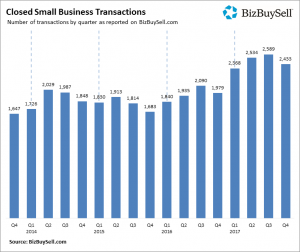Yes, we know. Your business is your baby, your all-encompassing life. But you are ready for the next step – retirement, moving to another industry or selling to focus on something else.
In order to move on you have to give someone else the reins. You have to let go of the control you’ve had as the owner of your business – and let’s face it, that’s incredibly tough.
Why?
You have to be a bit of a control freak to be a successful business owner. It’s the kind of mindset that keeps you driven and keeps your business from falling apart. It’s what gets you out of bed in the morning and working late into the night.
When the time comes to walk away, however, that strength of personality becomes a problem. You see, the person who is buying your business has the same entrepreneurial personality you do. They’ll be driven and determined, and you probably aren’t going to like them very much.
The phrase “too many cooks in the kitchen” comes to mind, right?
This clashing of personalities can, and has, derailed perfectly good deals.
As a seller you are going to have to get along with along with your replacement from the first conference call all the way through to the end of a probably weeks-long training period. That length of time can be agonizing if you aren’t particularly fond of the buyer – so how do you survive?
Keep your eye on the prize.
You aren’t selling your business on a whim. You need the money to fund your long-awaited retirement, to fund your next business venture, to help the family member you’re leaving entrepreneurship to care for. It can be tough to keep your emotions in check, but you need to stay focused on the fact that the selling of your business is a purely financial transaction.
Remember it’s not your business anymore.
A new owner is absolutely going to make changes – it’s inevitable. The sooner you come to grips with that fact the better, because they might start making those changes right in front of you before the training period is even complete. Just remember that you wouldn’t want someone telling you how to run your business, so don’t be the person who does that to the buyer.
Remember that just because you don’t like them doesn’t mean they won’t be a good business owner.
No two successful entrepreneurs are exactly the same – so the style, values and qualities of the new owner are probably going to be vastly different than your own. Your general dislike of a buyer because they were a complete pain during negotiations or because you hate the way they present themselves doesn’t mean they aren’t going to be able to continue the legacy of the business you built.
Don’t derail your deal. If you aren’t fond of the person who is buying your business, it’s perfectly acceptable for you to feel that way. You only need to interact with them until the training period is complete – then it’s on to the next phase of your life with the proceeds of your sale. Take a deep breath, you can get there.
Are you thinking about selling your business but are worried about having to hand over the keys? Have you had a horrible buyer experience you’d like to share? Please leave any comments or questions, we’d be happy to help.
Michael Monnot
941.518.7138
Mike@InfinityBusinessBrokers.com
12995 South Cleveland Avenue, Suite 249
Fort Myers, FL 33907
www.InfinityBusinessBrokers.com










